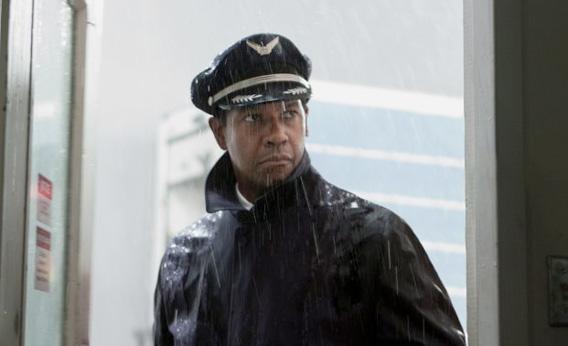Flight (Paramount Pictures), the suspenseful new addiction drama from Robert Zemeckis, is the director’s first live-action feature in a decade, and his most morally complex film yet. Of course, that’s not exactly Zemeckis’ specialty. (Who needs moral complexity when you have a flux capacitor?) In a recent New York Times interview, Zemeckis described encountering the grayscale ethical universe of Flight’s screenplay, which seemed new to him. “I’d never read anything like that,” he said.
If the idea of moral ambiguity is less novel to you, seeing Flight won’t exactly feel like rediscovering The Battle of Algiers. But it succeeds as a carefully balanced cocktail of uppers and downers, of the type favored by its hero. You’ll have a good night out, even if you don’t remember it in the morning.
It’s in a hungover condition that we first meet that hero, the wonderfully named maverick pilot Whip Whitaker (Denzel Washington). After an all-night coke-and-booze bender with one of his flight attendants, Katerina Marquez (actress and model Nadine Velazquez), Whitaker collects himself by blowing another quick line, throwing on his aviator sunglasses (no matter that it’s storming), and strolling down the jet bridge to the tune of Joe Cocker’s “Feelin’ Alright.” After Whitaker’s ascended through some severe turbulence to friendlier skies, an equipment malfunction suddenly sends the plane hurtling back toward the Atlanta suburbs. Despite his condition, or perhaps because of it (his sober copilot is losing his shit), Whitaker maintains his composure and ingeniously stabilizes the doomed jetliner by turning it belly-up. Once it’s leveled, the captain restores the plane to its full upright position and glides it into a nearby meadow.
This thrilling sequence is the best in the movie. When Whitaker comes to wearing a hospital gown (backless, I should note, for Denzel’s admirers), the movie comes back down to earth. Estranged from his wife and son, the instant national hero wakes up to find at his bedside his union rep, who informs him that Marquez and a few other passengers were killed in the crash landing. After a curt debriefing from the TSA, Whitaker gets a warmer reception from his dealer and apparent best friend (played by 2012’s craftiest scene-stealer, John Goodman). But Whitaker’s near-death experience seems to have prompted some self-examination: Of all Goodman’s medicines—vodka, cocaine, painkillers—Whitaker turns down all but a carton of cigarettes.
This battle of man vs. his liquor cabinet will serve as the central conflict for the rest of the film. Sure, Whitaker’s attorney (played with ease by Don Cheadle) will occasionally show up to remind him that he’s at the center of a legal battle that could put him away for life. And Whitaker will meet another recovering addict and love interest, a familiar hooker-with-a-heart type played by English actress Kelly Reilly. But the support of these potential allies hinges on whether Whitaker can fly straight. And though the crash sobered him temporarily, he soon decides he can manage his drinking. He landed a broken plane while coked up—can’t he steer his own addiction?
To its credit, Flight remains agnostic enough on this question to maintain credible suspense throughout most of its two-hour-plus runtime. In fact, while Flight is hardly an endorsement of drunk driving (let alone flying), it’s startling to see a character spend so much screen time getting away with it—most on-screen drunk drivers can’t drive a block without finding a telephone pole.
Because the movie is so focused on Whitaker’s internal struggle—there are a lot of longing stares into booze-filled fridges—Flight lives or dies by the performance of its star. Cinematic depictions of alcoholism tend to invite overacting, and Washington could easily have slid into the kind of swaggering and scenery-chewing performance that won him an Oscar for Training Day. But rather than letting the spittle fly like that movie’s Alonzo Harris, or like Nick Nolte’s alcoholic father in Warrior, Washington exercises a quiet strength, tucking away his pain, and, deeper yet, his guilt.
Which is why it’s too bad when Washington’s restraint is squandered by the heavy hand of Zemeckis, who in one scene plays the taking of a bottle from a hotel mini-bar for a horror-movie-level scare (the wee bottle doesn’t clink so much as gong) and who soundtracks Goodman’s entrance to “Sympathy for the Devil,” and a heroin injection to “Sweet Jane.” Washington’s powerful performance lets the viewer discern what he’s trying to convey. It’s too bad that Zemeckis, still new to ambiguity, hasn’t learned the same trick.
